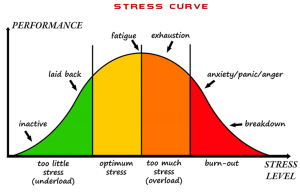Stress 101
Obviously, there are a lot of reasons to be stressed right now. Worry is in the air. Spend time with someone who is stressed and you start to feel stressed; stress and anxiety are contagious. They are, and always have been, more contagious than Corona Virus. Stress is an adaptive response in the body to help you stay safe. When it comes to Corona Virus, once you’ve done all you can to be safe, if you are still stressed, it is hurting you. Stress slows the immune system, digestive system and endocrine system. When you are stressed, your blood glucose level increases, fertility and metabolism decrease and your focus narrows (making it difficult to concentrate). What can be done to combat this? I’d like to suggest one cognitive, behavioral, spiritual technique and a couple additional psychological techniques.
Spiritual
Pastor, Karl Paul Reinhold Niebuhr preached, in 1943, this prayer:
“God, give me grace to accept with serenity the things that cannot be changed, Courage to change the things which should be changed, and the Wisdom to distinguish the one from the other.” This is commonly referred to as the “Serenity Prayer” in Alcoholics Anonymous.
Truthfully, our normal, day-to-day life is filled with uncertainty. We are all guilty of going through our days taking for granted that the sun rises, our family is healthy and we make it to work safely. When your day does throw you a curve-ball, do you gracefully accept it—doing what you can about it and letting go of what you can’t change? If COVID-19 has you feeling either extreme—hopelessness and giving up OR trying to over-control and plan. Consider this prayer. You may not believe in God or any spiritual being, but the principle of doing what you can and letting go of what is outside your control—trusting in a cosmic balance, per say, is essential for spiritual wellness. Put this prayer, or your own version of it, on repeat throughout your day. Ask yourself: Can I do anything about this right now? If so, do it (or put it on a to-do list for later). If not, ask the powers that be to help you to let go. Not sure how to let it go? Keep reading, the “Cognitive” section should help.
 Cognitive
Cognitive
The technique I picked for this category is called “planned worrying”. The principle here is that, sometimes, something good CAN come from thinking or worrying. This is a mind-control technique from the Cognitive-Behavioral Therapy toolkit! You need to pick a quiet time of day and set a timer for 15 minutes. Some people like to do this in the morning while they shower, others like to do it right before dinner and others like to do it midday. It is NOT recommended to do this before bed. You need to have something engaging for your mind planned for when the 15 minutes are up and the timer dings. During the 15 minutes, I want you to think and worry about all of those things that you can’t change. Go ahead, worry away. When the timer goes off, you stop, and become engaged in a mentally distracting activity (need help picking this, read on to the “Behavioral” section). The rest of your day you are prohibited from thinking and worrying. If you catch yourself worrying, you simply notice it and say something like “Its not your planned worrying time yet; you’ll have time later to think about this. You have other things to do right now”. Start a list if you need to, but keep that list somewhere out of plain sight.
Behavioral
It is ok to do things that are fun, distracting and mindless. If all you are in the mood for after a day at work is a light-hearted TV show, go ahead. I would just encourage you to take one intentional step before you turn on the TV. Be mindful about being mindless. Acknowledge how you feel, what you want and your decision to allow yourself to behave in this way. “I feel ____________, I would really like to do _______________. I will allow myself to do _______________ at _____________ AM/PM today”. Allow yourself the luxury of a really engaging distraction.
Other Psychological Techniques
Processing Grief
There are many losses associated with this health crisis. At the very least, there is a loss of perceived certainty and stability. The first stage of loss is “shock and denial”, as we move through these losses, we may start to feel the next stages—bargaining, depression, anger and eventually acceptance. There is no rush to move through these stages. Just notice and accept each one as they come and they will come at different points. I have found acceptance for the loss of work stability much quicker than I have for the losses my kids are suffering. I’m at the shock and anger phase most days when it comes to everything my kids are losing. I trust that if I continue to acknowledge, feel and process these feelings, I will move into acceptance.
Feeling Felt
Feelings are like the warning lights on your car’s dashboard. Warning lights do not drive the car, they don’t fix the car and they don’t wreck your car. But, if you ignore your feelings your car may stop driving, become damaged or you may waste a lot of time and money trying to fix the wrong part of the engine. Learn to tune into your feelings. Where do you feel it in your body? What does it feel like in your body? Why might you be feeling that? If you struggle to figure out the answer to the last one, I suggest keeping a log of feelings (asking yourself those questions), journal or get into psychotherapy. Once you know what you are feeling and why, you will know what part of the car needs to be fixed and start working on a plan to fix it.
Staying Connected
Another way to help you process grief or figuring out why you are feeling what you are feeling is to talk with a friend. During my EMDR training, my trainer, Dr. Andrew Leeds, told us that the research says there are two factors that make it less likely your will suffer from Posttraumatic Stress Disorder (PTSD) during a universal crisis (like COVID-19 or an earthquake). The first is a good support system. Not just lots of FB friends or IG followers, but real humans who know your authentic self and still love you. People who are actually, deeply supportive of the real you. People your guard comes down with. If this doesn’t describe anyone in your life, use this crisis as an opportunity to deepen a promising relationship. Therapy can often serve as a place to practice this type of authenticity to help you begin to share your real self in relationships outside of therapy.
Making Healthy Choices
No, I didn’t forget. What is the second thing Dr. Leeds said acts as a buffer from PTSD? Healthy coping skills! I like to put coping skills in two categories. The first is those healthy activities that are automatic like brushing your teeth, eating breakfast or sleeping 6-8 hours nightly. If your day-to-day routine has a few holes in it, work to create time for the missing pieces. At the most basic level, a healthy daily routine includes good sleep, healthy eating, exercise, hygiene and a little something for your relationships, spirituality and mental health. The second category of healthy coping skills are those that require a choice, in other words, they are not automatic. When you are tired from work, what do you do? Do you reach for a book in the bath or wine on the couch? There is nothing wrong with either choice, but again, just be mindful as you make the choice. Know that, if you choose wine, it might make your next day a little bit harder and put your immune system at risk. If you choose a bath and a book, there will likely be little negative impact on your health and might make tomorrow a little better. Be kind to yourself, reach for the healthier choice today.
Stress is Math
Imagine you are a water glass. I am going to fill your water glass half full, representing the normal stress needed to motivate you, Hans Selye called this “Eustress”. Let’s imagine you have a busier than normal day of work (pour more water into your cup), you get bad news from your mate (pour more water into your cup), your kid gets a runny nose (more water into your cup) and then the last of the toilet paper is gone (more water into your cup) and suddenly your cup is overflowing. Was it the toilet paper that caused your cup to overflow? No, it was everything added up. But, if you had had a good night sleep (pour water out of your cup), taken a yoga class (pour out more water) and called to talk with a good friend (more water out of your cup), you could’ve handled the toilet paper event without over-flowing. Right now, COVID-19 is putting water into ALL of our cups. Your normal coping mechanisms are not enough to mitigate this stress. You are going to need to find new, creative ways to empty your cup to keep up with the ever-increasing events that are filling your cup. Now is the time to be proactive. If you feel like your cup is close to its limit, act now. We need you to be at your best right now and in the days to come.
Therapy can Help
If you don’t have time to create a new coping regimen right now, leave that to your therapist. Your therapist can help you monitor your stress and therapy itself can be stress-relieving. But, often your therapist acts much like a physical therapist does. We teach you the exercises, you have to go home and DO those exercises and you come back in for monitoring of your progress or lack thereof, trouble-shoot and continue to work with you until you are functioning at full capacity again. If you decide to find a therapist, remember to find someone who you feel comfortable to be authentic with.
Growing Together
This is my first global pandemic, how about you? We are in new territory here. There is so much to learn about ourselves and our life right now. This article is meant to support and encourage growth. Please reach out for additional comments or questions. I’d love to hear from you and learn with you! Find me on FB (@gretapankratzlcsw) or IG (@smcounseling) or greta@smcounseling.com.
